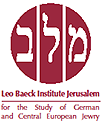German-Israeli Postdoctoral Seminar in German-Jewish History
When 14 up-and-coming academics from the Leo Baeck Institute Jerusalem and the Wissenschaftliche Arbeitsgemeinschaft of the Leo Baeck Institute in Germany (WAG) come together, the resultant curriculum is suitably far-reaching. An initial seminar in Berlin where the participants present their projects, a period of intensive exchange on their respective research processes over the six months that follow, and a final seminar in Jerusalem to allow the participants to present their reworked concepts and research findings to one another: a linear-sounding process that is actually highly complex and multifaceted. For it’s not just controversial debates about research questions and methodologies that form the focus here, as the project also requires to the participants to engage with the academic traditions and research landscape of the other country in comprehensive fashion. This includes exchanging ideas with senior scholars from the field in their respective academic contexts, with group visits to museums and memorials thematically linked to the research also forming a part of the bilateral seminar. The result? The creation of new academic networks connecting Germany and Israel, important impulses for future academic work in the field of German-Israeli historical research, and last, but not least, the publication of selected research projects in German and Israeli journals. This enables new continuities to emerge, both for the participants and within the subject discourse in Germany and Israel.
The Leo Baeck Institute Jerusalem together with the Wissenschaftliche Arbeitsgemeinschaft of the Leo Baeck Institute in Germany (WAG) is giving 14 doctoral and post-doctoral students the opportunity to present their current research and hold intensive discussions as part of the “German-Israeli Postdoctoral Seminar in German-Jewish History”. The project is taking place between July 2012 and February 2013 and comprises two five-day workshops in Israel and Germany, a 6-month exchange period spanning the time between them and a thematically-linked program of additional activities.






